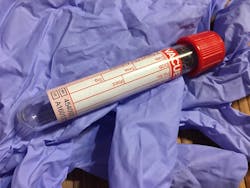A sensitive blood test being developed by a team of researchers at the University of Michigan Rogel Cancer Center shows promise for predicting whether patients with metastatic HPV-positive throat cancer will respond to treatment months earlier than standard imaging scans.
That’s according to a study, published in Oncotarget, validating the test in a small group of patients with metastatic human papillomavirus-related oropharyngeal squamous cell carcinoma — a type of head and neck cancer that develops in the back of the mouth and in the throat, according to a news release from the university.
If the test can quickly determine that a treatment approach isn’t helping, it could allow doctors to seek out alternative therapies or clinical trials in a more timely manner. It could also potentially spare some patients months of toxic side effects from a treatment that isn’t working.
The research comes amid a rising incidence of throat cancer caused by human papillomavirus infections, which are often spread through sexual activity. Once the cancer has recurred or spread within the body, patients typically only live for about one year. Furthermore, most of the available treatments, such as immunotherapy, work for less than 20% of patients and can have significant side effects.
The test is a form of “liquid biopsy” that looks for DNA shed by a patient’s cancer cells into their bloodstream using a method known as digital droplet PCR, which can amplify minute amounts of DNA for analysis.
The study analyzed more than 100 samples taken over nearly two years from 16 patients with advanced cancer that was positive for HPV 16, one of the most common, high-risk types of HPV infection. Seven of the patients were treated with immunotherapy regimens. Eleven patients underwent treatment that included chemotherapy.
The researchers found that increasing levels of HPV-positive circulating tumor DNA after a course of treatment were a strong indicator that the cancer was not responding to the treatment. And that the tumor DNA could be detected months ahead of tumor growth that can be measured on imaging scans.
Swiecicki points to one of the patients in the study as an example.
The patient underwent chemotherapy treatment for about 200 days. Their HPV 16-positive circulating tumor DNA fell to nearly zero for the first 100 days and imaging scans showed the disease had stabilized. But copies of the HPV 16 DNA started to multiply in their blood between day 100 and day 200, when the disease progression was ultimately detected on imaging scans.
The blood test may also be useful for early detection of recurrence before the cancer is incurable. According to additional findings the research team recently described in the journal Oral Oncology, HPV circulating tumor DNA is in the blood of patients with early stage throat cancer. Retrospectively, the test was also able to identify recurrent disease in a patient more than a year before it was detected by with standard approaches.
Before treatment, the patient had significant levels of circulating tumor DNA in their blood, which dropped down to near zero in the months following treatment.

